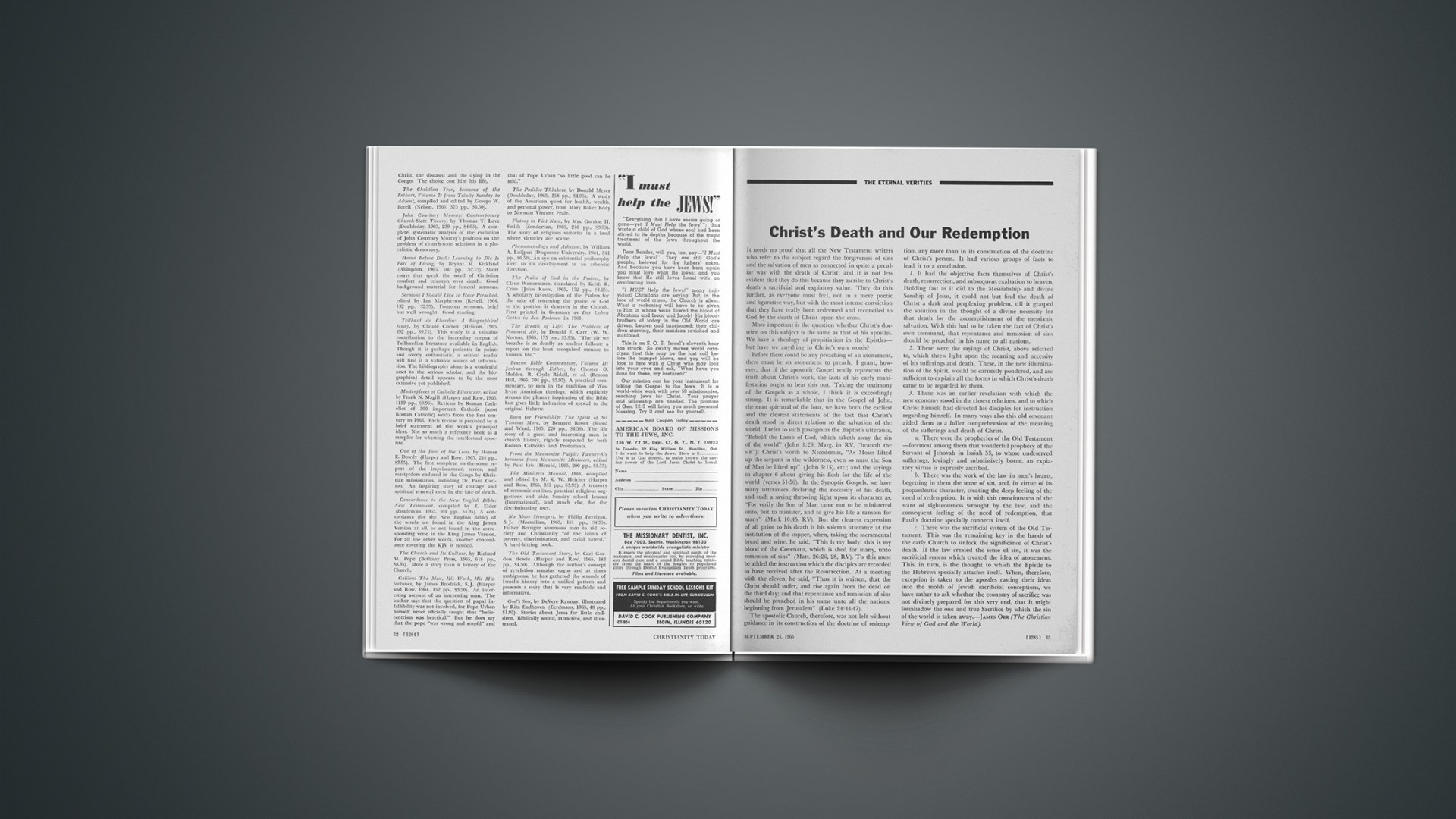It needs no proof that all the New Testament writers who refer to the subject regard the forgiveness of sins and the salvation of men as connected in quite a peculiar way with the death of Christ; and it is not less evident that they do this because they ascribe to Christ’s death a sacrificial and expiatory value. They do this further, as everyone must feel, not in a mere poetic and figurative way, but with the most intense conviction that they have really been redeemed and reconciled to God by the death of Christ upon the cross.
More important is the question whether Christ’s doctrine on this subject is the same as that of his apostles. We have a theology of propitiation in the Epistles—but have we anything in Christ’s own words?
Before there could be any preaching of an atonement, there must be an atonement to preach. I grant, however, that if the apostolic Gospel really represents the truth about Christ’s work, the facts of his early manifestation ought to bear this out. Taking the testimony of the Gospels as a whole, I think it is exceedingly strong. It is remarkable that in the Gospel of John, the most spiritual of the four, we have both the earliest and the clearest statements of the fact that Christ’s death stood in direct relation to the salvation of the world. I refer to such passages as the Baptist’s utterance, “Behold the Lamb of God, which taketh away the sin of the world” (John 1:29, Marg. in RV, “beareth the sin”); Christ’s words to Nicodemus, “As Moses lifted up the serpent in the wilderness, even so must the Son of Man be lifted up” (John 3:15), etc.; and the sayings in chapter 6 about giving his flesh for the life of the world (verses 51–56). In the Synoptic Gospels, we have many utterances declaring the necessity of his death, and such a saying throwing light upon its character as, “For verily the Son of Man came not to be ministered unto, but to minister, and to give his life a ransom for many” (Mark 10:45, RV). But the clearest expression of all prior to his death is his solemn utterance at the institution of the supper, when, taking the sacramental bread and wine, he said, “This is my body; this is my blood of the Covenant, which is shed for many, unto remission of sins” (Matt. 26:26, 28, RV). To this must be added the instruction which the disciples are recorded to have received after the Resurrection. At a meeting with the eleven, he said, “Thus it is written, that the Christ should suffer, and rise again from the dead on the third day; and that repentance and remission of sins should be preached in his name unto all the nations, beginning from Jerusalem” (Luke 24:44–47).
The apostolic Church, therefore, was not left without guidance in its construction of the doctrine of redemption, any more than in its construction of the doctrine of Christ’s person. It had various groups of facts to lead it to a conclusion.
1. It had the objective facts themselves of Christ’s death, resurrection, and subsequent exaltation to heaven. Holding fast as it did to the Messiahship and divine Sonship of Jesus, it could not but find the death of Christ a dark and perplexing problem, till it grasped the solution in the thought of a divine necessity for that death for the accomplishment of the messianic salvation. With this had to be taken the fact of Christ’s own command, that repentance and remission of sins should be preached in his name to all nations.
2. There were the sayings of Christ, above referred to, which threw light upon the meaning and necessity of his sufferings and death. These, in the new illumination of the Spirit, would be earnestly pondered, and are sufficient to explain all the forms in which Christ’s death came to be regarded by them.
3. There was an earlier revelation with which the new economy stood in the closest relations, and to which Christ himself had directed his disciples for instruction regarding himself. In many ways also this old covenant aided them to a fuller comprehension of the meaning of the sufferings and death of Christ.
a. There were the prophecies of the Old Testament—foremost among them that wonderful prophecy of the Servant of Jehovah in Isaiah 53, to whose undeserved sufferings, lovingly and submissively borne, an expiatory virtue is expressly ascribed.
b. There was the work of the law in men’s hearts, begetting in them the sense of sin, and, in virtue of its propaedeutic character, creating the deep feeling of the need of redemption. It is with this consciousness of the want of righteousness wrought by the law, and the consequent feeling of the need of redemption, that Paul’s doctrine specially connects itself.
c. There was the sacrificial system of the Old Testament. This was the remaining key in the hands of the early Church to unlock the significance of Christ’s death. If the law created the sense of sin, it was the sacrificial system which created the idea of atonement. This, in turn, is the thought to which the Epistle to the Hebrews specially attaches itself. When, therefore, exception is taken to the apostles casting their ideas into the molds of Jewish sacrificial conceptions, we have rather to ask whether the economy of sacrifice was not divinely prepared for this very end, that it might foreshadow the one and true Sacrifice by which the sin of the world is taken away.—JAMES ORR (The Christian View of God and the World).










